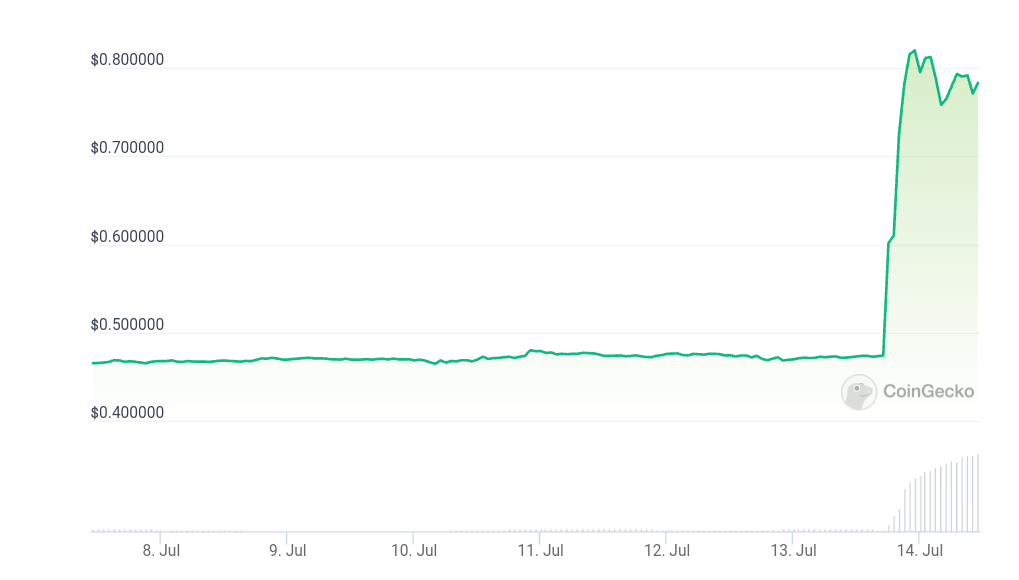A U.S. judge ruled Thursday that Ripple Labs Inc. did not violate federal securities law when it sold some of its XRP token on public crypto exchanges. The ruling is only partial, but it is being celebrated as a landmark victory for the cryptocurrency industry.
The price of XRP, the native token of the Ripple ecosystem, soared more than 83% to $0.86 per coin after the news, according to CoinGecko. As of writing, XRP had pared some of those gains, easing to $0.78. The token remains 77% off its all-time high of $3.40 reached on Jan. 7, 2018.
The ruling breathed life into other cryptocurrency tokens that were at risk of being classified as “securities”. Matic rose 18%, litecoin and solana jumped nearly 19% each and Cardano’s ADA gained over 20%. Bitcoin and ethereum also climbed higher, rising over 4% and 6% in that order.

XRP price ($)
‘XRP not a security’
Ripple is a privately-held fintech company that provides a global payment solution via its patented payment network called Ripple Network. The company connects banks, payment providers, and crypto exchanges, enabling real-time settlements and lower transaction fees.
In December 2020, the U.S. Securities and Exchange Commission (SEC) filed a lawsuit against Ripple, the issuer of the eponymous XRP token, for selling $1.3 billion worth of the asset without registering it as a security with the agency.
Ripple co-founder Chris Larsen, and CEO Brad Garlinghouse, who founded the company in 2012, were also cited as co-defendants in the matter. The company denied that XRP was a security. Securities are under strict regulation from U.S. agencies.
Also read: Coinbase Stocks Soar as Cathie Wood’s Investment Firm Cashes In
In her ruling, the Southern District of New York Court Judge Analisa Torres determined that XRP was “not necessarily a security on its face,” potentially putting an end to a case that has dragged on for three years.
The ruling applies to sales of XRP on crypto asset exchanges since buyers did not expect to make a profit from Ripple’s efforts. Torres said the retail sales of XRP were “blind bid/ask transactions [in which buyers] could not have known if their payments of money went to Ripple, or any other seller of XRP.”
The judgment was split into three categories of XRP sales: institutional sales, programmatic sales, and other distributions. Institutional sales were found to be securities offerings, while programmatic sales and other distributions were not.
It wasn’t all good news, however. The SEC was partially successful in some of its claims against Ripple. Judge Torres ruled that Ripple’s sales of $729 million worth of XRP to hedge funds and other sophisticated buyers constituted unregistered sales of securities.
Crypto industry reacts
Ripple CEO Brad Garlinghouse called the ruling “a huge win for Ripple but more importantly for the industry overall in the U.S,” Reuters reported.
The most important part of this ruling:
“XRP, as a digital token, is not in and of itself a “contract, transaction[,] or scheme” that embodies the Howey requirements of an investment contract.”
This is a now a matter of law (not up for trial.)
— Brad Garlinghouse (@bgarlinghouse) July 13, 2023
Stuart Alderoty, chief legal officer at Ripple tweeted that: “As a matter of law, XRP is not a security. Also a matter of law, sales on exchanges are not securities. Sales by executives are not securities. Other XRP distributions, to developers, to charities, to employees are not securities.”
Coinbase, which had previously de-listed XRP on its trading platform, said that it would now allow trading of the asset again.
“We’ve read Judge Torres’ thoughtful decision. We’ve carefully reviewed our analysis. It’s time to relist,” Coinbase chief legal officer Paul Grewal said on Twitter.
Gemini said it’s “exploring the listing of XRP for both spot and derivatives trading.”
U.S. congressman Tom Emmer praised the ruling saying, “the Ripple case is a monumental development in establishing that a token is separate and distinct from an investment contract it may or may not be part of. Now, let’s make it law.”
However, other observers are being cautious. Stephen Palley, a partner at Brown Rudnick, told CNBC that “the notion that XRP is plainly not a security is wrong.” Still, “if I were an XRP holder, I’d be happy right now,” he added.
Torres’ ruling comes at a time when the crypto industry is facing significant macroeconomic headwinds and as U.S. regulators clamp down on the sector, highlighted by lawsuits brought by the SEC against Coinbase and Binance in June.
Ripple’s win casts the industry in a different light, making it a major reason for celebration in crypto circles.
- SEO Powered Content & PR Distribution. Get Amplified Today.
- PlatoData.Network Vertical Generative Ai. Empower Yourself. Access Here.
- PlatoAiStream. Web3 Intelligence. Knowledge Amplified. Access Here.
- PlatoESG. Automotive / EVs, Carbon, CleanTech, Energy, Environment, Solar, Waste Management. Access Here.
- BlockOffsets. Modernizing Environmental Offset Ownership. Access Here.
- Source: https://metanews.com/sec-targets-coinbase-in-lawsuit-staking-services-suspended/



